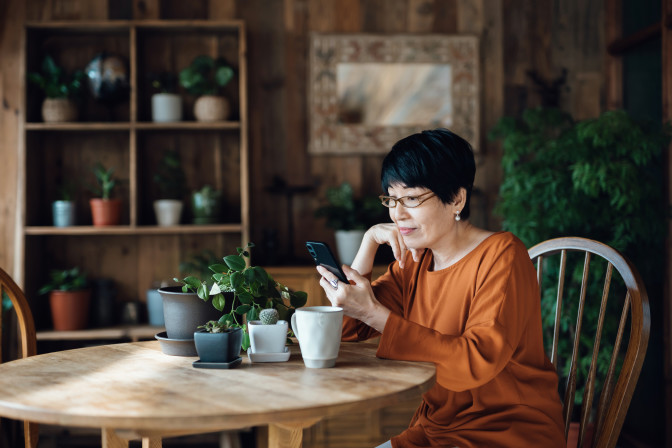Buy One, Get One 50% OFF Eyeglasses
* Restrictions apply. Ask a Team Member for details.
Is Dark Mode Better for Your Eyes?
Your smartphone may have a "dark mode" or "night mode" setting. This alters the view on your screen from a white background with dark text to a black background with white text. Some people change their phone view to dark mode permanently. Some prefer to use it only at night and others prefer not to use it at all. It may seem to be gentler on the eyes to look at a darker screen, especially when it's dark outside. But is dark mode better for your eyes?
Read on to find out more about the potential benefits and pitfalls of using dark mode on your phone.

Visit the Experts at eyecarecenter
The eye doctors at eyecarecenter are here to discuss your eye care concerns and get you the treatment you need. Schedule a consultation at a North Carolina location near you today.
How Dark Mode May Make Phone Viewing Easier
Many people choose to use dark mode or dark theme in the evening, when they're outside at night, or when they're sitting indoors in a dimly lit room. Looking at a screen with a dark background may feel more comfortable than looking at a bright screen in a dark setting because you'll see less glare in dark mode. The night-friendly setting reduces the overall brightness output from the screen, making less of a contrast with the world around you. Dark mode should make it easier for your eyes to adjust from your dimly lit surroundings to your phone screen, reducing screen glare. This may reduce eye strain and minimize eye fatigue.
This is why car navigation systems and GPS devices switch to dark mode after sunset. It's safer for drivers to periodically glance at a darkened screen while they're traveling along dark roads, rather than a fully lit device. That would require the eyes to adjust to the brightness, then readjust to darkness when they look back at the road. The same can be said for individuals trying to sleep in dark rooms, as reducing blue light can lead to better sleep production.
Research on the Benefits of Dark Mode
But is dark mode better for your eye health? Very little research has examined the benefits of choosing dark mode, possibly because it's a relatively new feature for phones. Much of the research has focused on dark mode's ability to help people fall asleep more easily at bedtime because it limits the amount of blue light that reaches the eyes in the evening. Exposure to blue light from phones mimics sunlight, and it can delay the production of the sleep-inducing hormone melatonin as bedtime approaches. Dark mode's blue light filter has been shown to help encourage nighttime melatonin production, regulating an individual's circadian rhythms.
Spending too much time looking at bright screens throughout the day may lead to digital eye strain, with symptoms like eye fatigue, dry eyes, or blurry vision. Screen brightness is only one factor — people tend to blink less frequently when looking at screens, which may lead to dry or strained eyes. Blinking more frequently helps to reduce symptoms, but no research has shown that viewing devices in dark mode encourages more frequent blinking.
Who May Benefit from Using Dark Mode?
People who spend all day looking at computer and phone screens may benefit from using dark mode some or all of the time, especially in the evening. You may be at greater risk of eye strain or fatigue if you use devices for several hours every day. Looking at words and images on a darker background as opposed to a light background may give your eyes a rest from exposure to bright light, which can help prevent or relieve discomfort.
Using dark mode alone may not eliminate device-related eye strain or fatigue. Combine the practice with eye-friendly habits like looking up from your phone periodically and trying to blink more often.
Who May Experience Issues with Using Dark Mode?
For people with certain eye conditions, looking at white text on a dark screen may cause a halo effect, when a blur of light surrounds the brightness amid the darkness. This may affect people with myopia (nearsightedness), astigmatism (an irregularity in the curvature at the front of the eye), or presbyopia (an age-related decline in the ability to focus on things that are near the eyes).
The halo effect isn't exclusive to smartphones and other digital devices; any bright light viewed within a dark field of vision may cause this effect. For example, some people who have myopia, astigmatism, or presbyopia see halos around headlights or streetlights when they drive at night.
Do you experience the halo effect when you put your smartphone on dark mode? You may see things more clearly and reduce your nighttime exposure to bright light if you switch to regular light mode (black text on a white background). Then, you should turn the brightness down considerably during evening hours.
Schedule an Appointment with eyecarecenter
If you are experiencing eye discomfort, it may be time for a comprehensive eye exam. One of our specialists will assess your eyes and form a treatment plan to suit your needs. Schedule an appointment today.